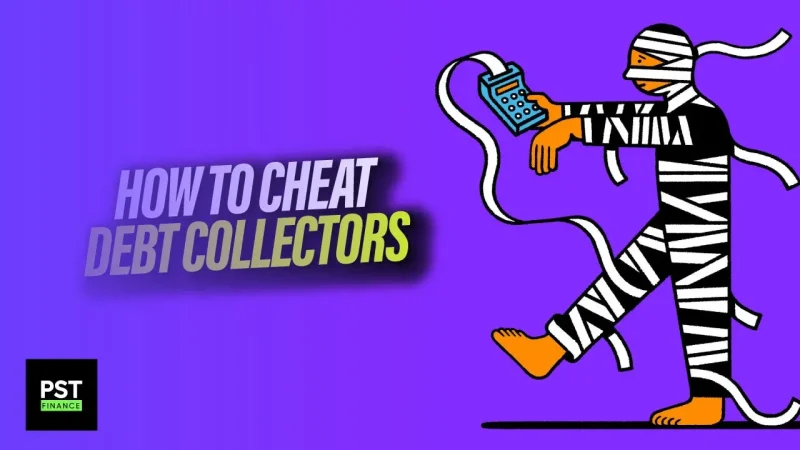Being in debt is no fun. But what’s worse is that a collection agency will usually try to cheat you out of more money than you should pay. They can also significantly hurt your credit score, which is essential for any major loan or payment you might want to make, from car payments and mortgages to even the smallest offers by telecommunication companies.
But debt collection is a game that two can play. If you’re resourceful enough, you can cheat debt collectors (legally, of course) and get away with paying much less than they ask you to while keeping your credit score intact. Let’s take a look at the most important tips and tricks that help you do that.
What is a Collection Agency?
When you default on a debt, it goes to collections, or, in other words, you get a collection account, which shows up on your credit report. This means that your debt will be handled either by an internal collection department or an independent collection agency.
In any case, those are people who specialize in contacting defaulters and making them pay, either by trying to reach an agreement with them or, unfortunately, by threatening or manipulating them in many cases.
Understanding the collection process and knowing your rights should then help you protect yourself from manipulation and allow you to repay your debts in the most convenient way so you don’t unnecessarily hurt your credit score or pay more than you should.
First, you should remember what the point of a collection agency is. At the end of the day, if your creditor really wants to get you to pay your debt, there are legal channels for that; they could just take you to court. But the legal process takes time, effort and money, which makes it difficult for creditors to keep on legally chasing each and every debtor. So the task of those responsible for debt collection is to try to get debtors to pay by reaching an agreement without having to go to court.
This means that the process of debt collection is more or less informal, in the sense that the goal is just for you to pay, regardless of how exactly it is reached. Depending on the collection agency and your situation, they might try to harass you to scare you into paying, or they could be open to negotiation and encourage you with a good payment plan.
This is not to say, of course, that there are no legal constraints on the process whatsoever, but in general, how much you pay and how you pay it will depend a lot on your negotiation skills and the tricks up your sleeve.
We’ll see in detail the tricks you should know to deal with collectors. Before we do that though, it’s worth noting that your debt, as we said earlier, can be handled either by an internal department or an external collection agency (CA). If it’s an internal department, this means that your original creditor is who is communicating with you, and any money you pay will go to them.
If, on the other hand, an external CA is communicating with you, this means one of two things. Either the original creditor has hired an agency to collect the debt for them, or they have completely sold the debt to the agency. In the former case, the original creditor wants to get the money, and will give a percentage of it to the agency responsible for collection. If it’s the latter, then the original creditor no longer has anything to do with your debt, and any money you pay will go to the external agency.
This is important because when a debt is sold to a collection agency, it’s typically sold at a fraction of its original value. For example, if the original value of your debt is $1000, the CA could buy it at, say, $100. They will then attempt to get the $1000 you owe from you, making their net profit $900. Or they could even charge interest on top of the original $1000 and try to get, say $1100 or $1200 from you.
What’s crucial here is that even if they get half of that money (so around $600) they will still make a net profit of $500. For that reason, CAs are often willing to negotiate to get things done as soon as possible. So don’t cave in without negotiating to the best of your ability. Anyway, the negotiation step actually comes later in the process, so we should start at the beginning.
Step 1: Dispute the Debt
You’ll find out that you have a collection account when you check your credit report or when a collector contacts you. When your defaulted debt has been reported, it stays on record for a maximum of 7 years, after which it gets removed, even if not paid.
Given this, in addition to the fact that most collectors don’t want to take you to court, you might be thinking that you can just ignore the issue until it gets removed 7 years later. This could be a very bad move, however, for a number of reasons.
First, as we said at the beginning, your credit score is very important for many of the payments you will have to make throughout your life, and having a collection account on your credit report for 7 years might tank your score. Second, after all, around %15 of collection cases are eventually taken to court, so it’s probably best not to take any chances.
You could, then, ignore the issue completely. But since, I imagine, the risks involved aren’t super ideal, you should handle things differently.
So what should you do once you’ve found out that you have a collection account? The first order of business is to dispute the debt. Don’t start negotiations before you have done so, and don’t listen to any collector who may tell you that disputing a debt could hurt you or make it difficult to pay it later on; these are scare tactics.
But be cautious, this doesn’t mean that you should be disrespectful to the collector, as you don’t want this to turn into a personal issue. The only thing you need to do is to be firm and assertive while remaining calm and respectful. This is especially relevant if your debt is high and you’re confident in your ability to pay it.
During the initial phone call with the collector, they will provide you with the details of the debt and their contact information. Alternatively you may find their contact information on your credit report. Do not discuss the debt with the collector or tell them anything about your financial situation, because they could use that against you. Just find their contact information and use it to file a dispute.
Now, how do you file a dispute? You can do that online by visiting the websites of one of the three credit bureaus in the US and sending a dispute letter, or you could send a physical dispute letter to the address provided by the collector. Make sure to use a method that tracks letters and shows if they’ve been received. As a rule of thumb, make sure to document all your communications throughout the process.
The dispute is actually a verification request, in which you ask the collector to provide you with evidence that the debt is yours, and that the owed amount is accurate, and so on. Don’t lie or say that the debt isn’t yours, just ask for verification. If the collector is an external CA, mention that you don’t have any official agreement between you and this agency, and that you’d like proof that they’re authorized to collect that debt.
The advantage of sending a verification request is that it gives collectors a limited window to respond and provide accurate documentation of the debt and their permission to collect it. The information they provide has to exactly match what the credit bureau has on file for you. Additionally, the CA may not actually have official documentation that they’re allowed to collect the debt.
Anyway, if the CA fails to respond within 30 days, or it fails to provide accurate information and documentation, your debt will be removed automatically by the credit bureau, and you won’t need to do anything else.
One thing you could also do is dispute the accuracy of the debt information provided by the CA on your credit report. The amount owed, for example, could be off. For every violation or inaccuracy you can spot, the agency could be fined for around $1000. Talk to a lawyer if you find such violations, and don’t worry, the agencies will be required to pay for your lawyer fees, which means that lawyers will be happy to take cases like yours for free!
Step 2: Negotiate
Now, the agency isn’t supposed to contact you until it provides a debt validation letter. So what happens if it does? You enter the negotiation phase. You will have to agree with the CA on the amount of money you must pay and how you will pay it. In other words, you work together to come up with a decent payment plan. Here’s a list of the Dos and Don’ts when you’re negotiating with a collector:
- Communicate via emails as much as possible, and phone calls are fine too. Emails are easy records to keep in case of any dispute, and they give the impression to the collector that you’re not desperate to get rid of the debt.
- Don’t ever mention that you desperately need to improve your credit score for any major reason, such as taking out mortgage loans. That would only give the collector leverage over you. Don’t tell a sad story about your financial situation either; they don’t care.
- Keep in mind that they don’t expect you to pay the full amount, and that they’re open to settling for much less than the original value of the debt. Negotiate firmly and respectfully.
Aside from these tips, the most important part is to make sure in all your communication with them to be clear that you want to reach a pay-for-delete agreement. This means that you want them to remove your collection account from your credit report after you’ve made the payment. This is crucial because the CA could otherwise mark your debt as “paid-as-agreed” without removing it after you pay. This will stay on your record and will never be removed even after 7 years have passed. Having a “paid-as-agreed” mark on your record can seriously hurt your credit score, since it shows that you have once failed to meet your financial obligations and had to have a CA collect money from you.
To have the CA remove the debt from your record you need to negotiate wisely to reach such an agreement. In most cases, CAs are willing to remove your debt, but sometimes this could be difficult if, for example, you’ve made an enemy out of the collector you’re communicating with; this is why it’s important to keep matters civil in all your communication.
If the CA absolutely refuses to remove your debt, you could either negotiate further or refuse to pay. Failing to have your debt removed from record will hurt your credit score anyway, so it might be best to wait for the 7 years to pass so the debt can be automatically removed. However, there’s always the threat of being taken to court, but if your debt is too small, it’s very unlikely that the CA will sacrifice time and money to take legal action against you. In the end, you should consider your situation and see how much risk you’re willing to take and why.
Step 3: Remove Debt from Records
Finally, what should you do if the collection agency doesn’t remove your debt even though they have agreed to do so? First, of course, just call them and see what they have to say. If that doesn’t work, file a complaint with the Better Business Bureau (BBB). The CA will most likely try to settle the issue so they get the complaint removed from their BBB profile.
Moreover, you could file another dispute with a credit bureau. Submit any evidence you have (such as email correspondence) that the CA agreed to remove the debt. At this point, the CA will probably just remove the debt instead of trying to validate it all over again.
Conclusion
So, to recap: when you first find out that you have a collection account, find the contact information of the collection agency, then check whether the debt is really yours. Second, file a dispute with a credit bureau or send a verification request to the address of the CA. You could also talk to a lawyer about any inaccuracy you’ve spotted. Third, if the CA does respond with a debt validation document, negotiate respectfully but firmly and keep in mind that they are always willing to settle for a price much lower than the original value. Fourth, try as much as possible to pay only when you have a pay-for-delete agreement. And lastly, file a complaint with the BBB or a credit bureau if the CA doesn’t keep up its end of the bargain.
Now you have everything you need to make sure that debt collectors can’t scare or manipulate you into messing up your financial situation or credit score by getting way more than they deserve. Of course, hopefully you won’t find yourself in such a situation, and the best way to avoid debt collectors is not to default on a debt in the first place. But if things happen and you’re dragged into this situation, you now know what to do.
Disclaimer
Please visit and read our disclaimer here.









